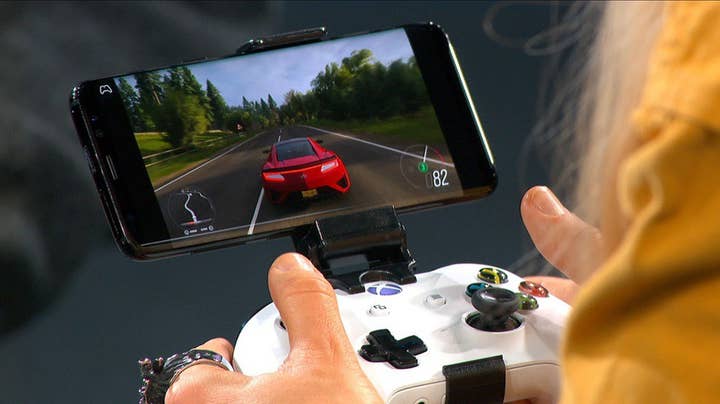Kicking off the streaming wars | Opinion
GDC 2019: Industry giants have decided that the medium's future lies in streaming - but success is far from assured even for enormous players like Google and Amazon
That streaming services will play some kind of role in the next generation of video games is already a given. The industry's biggest players have made that decision and stepped up the enormous investment in technology and infrastructure required to make it into a reality. Sony's PlayStation Now has been slowly evolving in the background with fairly little fanfare; now Microsoft's xCloud has taken an important step forward with a live demo, supposedly a lead-in to public trials later this year.
The other shoe whose dropping many pundits are eagerly anticipating belongs to Google, and that will hit the floor at GDC next week. The company has hinted at a gaming announcement more significant than anything it's done in the space so far -- hardware may be on the table but it's widely expected that a streaming service will be the main dish, with anything physical being in the form of controllers or streaming boxes to support the service. As the notion of a "Netflix for Games" service takes root, all of the major players are positioning themselves to make sure they get their slice of the pie.
On the surface, this puts Sony and Microsoft right onto a collision course with Google -- and it also raises big questions about what other market players will do to ensure they're not left out.
"Even if Apple's blind-spot around gaming keeps it away from serious engagement with this sector, Amazon looks like a shoo-in"
If Google and Microsoft -- two of the biggest cloud services providers in the world thanks to Google's Cloud Platform and Microsoft's Azure -- are using their infrastructure to these ends, surely Amazon -- whose AWS platform dwarfs them both -- can't be far behind? And, while it's not such a player in cloud services (aside from the infrastructure it's built for its own systems), Apple surely won't let Google steal such an important march on it in terms of services offered on their competing platforms?
I wouldn't actually bet much on that last prospect, but even if Apple's historical blind-spot around gaming continues to keep it away from serious engagement with this sector, Amazon looks like a shoo-in. And having four of the world's biggest tech companies (a line-up in which Sony actually ends up looking like something of a minnow) all competing for the same prize looks like a recipe for bloodied noses, bruised egos and ravaged bank balances.
Just as the video streaming market is getting ready for an almighty showdown as both Apple and Disney take aim at Netflix's market share, the games industry could also see its streaming services becoming a battleground for giant companies with far broader ambitions.
Ironically, the last time major industry players tried to make gaming into a key battleground for a broader conflict the most tangible result was the Xbox -- a console market entry designed in no small part to give Microsoft a beachhead in what it feared could become a major battle for consumer hearts and minds with Sony. Now both of those firms look set to end up in a direct conflict with even bigger companies for dominance of game streaming.
Or are they? Looking at the substance of what both Sony and Microsoft are doing in this space, something very striking emerges. Both companies are pitching game streaming as a "fill in the gaps" kind of service, and not a replacement for anything you currently do. At least for the foreseeable future, PlayStation Now and xCloud are both positioned as being a way to extend your gaming experience so that you can pass some time while you're commuting or away from home by engaging with your favourite games on a tablet, laptop or mobile device. They are snacks between meals, not alternatives to meals.
"There remain a lot of places where broadband speeds are not up to the task of providing high-quality game streaming"
If you're Google (or Amazon, or Apple), then the pitch has to be somewhat different. Google doesn't have any previous skin in the gaming space -- its function as creator of Android arguably gives it even less actual industry involvement than Microsoft did back in 2001, when at least it had some experience as a platform holder and publisher of Windows games. Amazon and Apple are even more distant, despite Amazon's recent gestures in the direction of becoming a games publisher and distributor.
For each of these companies, pitching a snack between meals isn't worthwhile; they have to somehow convince consumers that any streaming service they launch is really a meal in itself, a credible outright replacement for their Xbox, PlayStation or gaming PC.
That's a hell of a tough sell. The pared-back, filling-in-the-gaps nature of what Microsoft and Sony are gearing up to offer isn't down to a lack of ambition on the part of either company; it's a fairly realistic pitch for a streaming service given the combination of both technical and cultural obstacles standing in the way. There remain a lot of places, including plenty of wealthy first-world urban areas, where broadband and mobile speeds are not up to the task of consistently providing high-quality game streaming, or where data capping and charging remain in place.

5G and ongoing fibre optic rollouts will help a lot, but we're still quite a long way from being able to say mission accomplished on this front. Even 4K streaming of movies -- a far less technically demanding task -- is a pipe dream for many consumers at peak times such as evenings and weekends. Meanwhile, a large and influential part of the culture around games is focused on latency and visual quality (let alone the whole question of ownership itself). There is probably a pretty solid audience out there that's willing to consider streaming as a nice-to-have extra for long train rides or hooking up to the hotel TV on business trips. But willing to ditch their console or PC? not so much.
"The lack of noise around the commercial impact of PS Now tells you a lot about how consumers have responded"
That creates a fairly tricky economic environment for streaming services. PS Now is presently offered as a $19.99 per month (or, more reasonably, $99.99 per year, though that whopping 58.3% discount tells you a fair bit about how much the service actually gets used by annual subscribers) subscription independently of PS Plus, which has almost certainly not been working very well for the service. PS Now was specced out initially as a full-bore Netflix-for-games offering, and the sheer lack of noise around its commercial impact thus far tells you a lot about how consumers have responded.
We don't know how xCloud will be priced, but it's far more likely to end up being an ancillary service that plugs into an Xbox Game Pass subscription -- a few bucks extra a month to be able to stream the games you can already access through Game Pass to your thin client (mobile phone, tablet etc.) as well. Sony at some point is also going to have to rationalise the existence of PS Plus and PS Now as separate services, and will likely end up with a broadly similar model.
Without the ability to do that -- with no existing subscription to tag a hypothetical Google or Amazon streaming service into -- the new entrants into the market are going to face an uphill struggle. Their entries will presumably end up looking very much like PS Now in terms of pricing and offering, even as Sony -- if it's serious about making this work -- will be looking at radically reworking PS Now's value proposition by the time the PlayStation 5 rolls around.
The new services will need to convince rightly dubious consumers of the technical strengths of the streaming approach and get them to fork over a significant fee. Existing players can make far less extravagant technical claims and market streaming as a cheap add-on to existing game subscription fees, not dissimilar to how Netflix charges a few extra dollars each month to use more devices or stream 4K content.
This isn't to say that the entry of players like Google into the market won't shake things up -- it will, of course -- but even if what it announces at GDC next week really is an all-singing, all-dancing streaming service for games, Microsoft and Sony will still be the players to beat. It's worth bearing in mind what happened the last time a huge industry giant set its eyes on this industry; the Xbox may have its admirers but it was hardly a commercial knockout, with Microsoft only really finding its feet with a second generation of hardware.
Neither Google nor Amazon is likely to do much better with their first attempts, especially when their likely point of entry is a technology that still has a long way to go in convincing consumers of its value.

